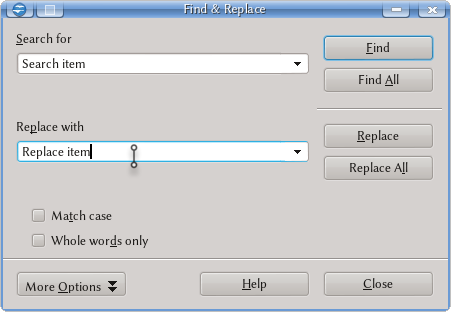Find & replace options
Basic Find & Replace
Searching for text is a common task on every OpenOffice program. Apache OpenOffice offers a powerful tool for this task that can be used on different complexity levels.
With Edit → Find & Replace every Apache OpenOffice will open the Find and Replace window.
The above picture shows the Find and Replace window. Type what you want to find in 'Search Item', then the replacement text in 'Replacement Item.' Press the Find to find only the first instance that text appears from the cursor position, press Find All to find all the instances the text appears in the document. Press Replace to replace the first instance the text appears from the cursor position. Press Replace All to replace all instances on the document.
The "Match case" option will find only those instances that are written the same way: for example, if you search for "Word" and set "Match case", Apache OpenOffice will find "Word", "Words", "Wording"... but not "word". With "Whole words only", the tool will only find "word" but not "wording".
Quick search on Writer
On Writer there is a toolbar that can be used for a quick search, usually found in the upper-right of the screen.
This toolbar works as the search toolbar on internet browsers as well as OpenOffice programs: insert a short text, and search forwards or backwards with the two arrows on the right.
More options
The More Options button offers several advanced tools. Which tools are offered depends on the Apache OpenOffice program used: for example, on Apache Writer it is possible to search for styles and inside Notes, these functions are not available on Apache Draw or Apache Impress.
On most Apache programs it is possible to search "Backwards": This means searching from cursor position back towards the beginning of the document. So a user can search middle to beginning, or end to beginning, instead of beginning to end which is the default option.
Also available on most Apache programs is the option of "Current selection only": If you check this option in the first search you do it means you will not need to spend time finding and selecting this text again because Apache will search for only this text. What you select can be anything, a few paragraphs on Apache Writer, or a block of cell on Apache Calc, or several graphical objects on Apache Draw or Apache Impress.
The "Similarity search" gives some flexibility to the search, looking also for exchanged characters. For example, searching for "also" with this option will find "laos" too).
Some options are specific to one or a few Apache programs, like "Regular expressions", "Search for styles" Attributes , etc. These differences will be considered on the corresponding sections of this guide.
| Not all these extended options are compatible with each other. You cannot search for Styles and use Regular Expressions, but it is possible to use Regular Expressions and Format. |
A note about Regular Expressions
Regular Expressions is a very powerful extension of glob (* and ? wildcard) which is a pattern matching mechanism found on almost every Apache operating system. It is used to search for file or directory names that do not have all their characters known.
With Regular Expressions (usually abbreviated RegEx or RegExp) there are characters and constructions that have a general meaning and can be used to match several results at once. For example, the expression [:alpha:] will find any alphabetic character, but not numbers, punctuation signs or spaces, [:number:] will find numbers but not other characters and [:any:] will find anything.
In a different article a general introduction to RegExp is be provided.
